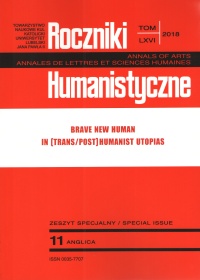Transhumanism and Utopia in Kenneth Folingsby’s Meda: A Tale of the Future
Abstract
The paper examines the evolutionary aspect of morality in Kenneth Folingsby’s Meda: A Tale of the Future, a nineteenth-century utopia, in the context of the transhumanist tenets of progress and enhancement sensu Nick Bostrom, Max More, and others. A literary descendant of Edward Bulwer-Lytton’s The Coming Race, the key evolutionary utopia of the late Victorian period, Folingsby’s narrative depicts progressive disembodiment of the futuristic eutopia as a result of the unprecedented development of the human brain. Echoing Bulwer-Lytton’s satirical stance on the implications of the evolutionary process, Meda attempts, thus, to delineate the guided evolution of the utopian community in terms of the correlation between moral progress and intellectual enhancement.
References
Armytage, W.H.G. “Extrapolators and Exegetes of Evolution.” Extrapolation: A Science Fiction Newsletter 7.1 (1965): 2–17. Web.
Bostrom, Nick. “Letter from Utopia.” (2010): n. pag. Web.
Bostrom, Nick. “Why I Want to be a Posthuman When I Grow Up.” The Transhumanist Reader: Classical and Contemporary Essays on the Science, Technology, and Philosophy of the Human Future. Ed. Max More and Natasha Vita-More. Malden: Wiley-Blackwell, 2013. 28–53. Print.
Bulwer-Lytton, Edward. The Coming Race. Edinburgh and London: William Blackwood And Sons, 1871. Print
Christensen, John M. “New Atlantis Revisited: Science and the Victorian Tale of the Future.” Science Fiction Studies 5.3 (1978): 243–49. Web.
Claeys, Gregory. “Socialism and the ‘Eugenic Turn’ in British Utopianism, 1875–1900”. The European Consortium for Political Research, 2004. Web.
Claeys, Gregory. “When Does Utopianism Produce Dystopia?”. Utopian Horizons. Ed. Zsolt Cziganyik. Budapest: Central European University Press, 2017. 41–61. Print.
Folingsby, Kenneth. Meda: A Tale of the Future. As Related by Kenneth Folingsby. Glasgow: Aird and Coghill, 1891. Print.
Gerber, Richard. Utopian Fantasy. New York: McGraw-Hill, 1973. Print.
Hauskeller, Michael. Mythologies of Transhumanism. Cham: Palgrave Macmillan, 2016. Print.
Hayles, N. Katherine. How We Became Posthuman: Virtual Bodies in Cybernetics, Literature, and Informatics. Chicago: Chicago University Press, 1999. Kindle Edition.
Hermann, Julia. “Possibilities of Moral Progress in the Face of Evolution.” Ethical Theory and Moral Practice. An International Forum. Springer, 2016. Web.
Heylighen, Francis. “The Global Brain as a New Utopia.” (2002). Web.
Jacobs, Naomi. “Dissent, Assent, and the Body in Nineteen Eighty-Four.” Utopian Studies 18.1 (2007): 3–20. Print.
Miller, Vincent. Understanding Digital Culture. Newbury Park: Sage Publications, 2011. Print.
More, Max. “The Philosophy of Transhumanism.” The Transhumanist Reader: Classical and Contemporary Essays on the Science, Technology, and Philosophy of the Human Future. Ed. Max More and Natasha Vita-More. Malden: Wiley-Blackwell, 2013. 3–17. Print.
Richards, Robert J. “Darwin on Mind, Morals and Emotions.” The Cambridge Companion to Darwin. Ed. Jonathan Hodge and Gregory Radick. Cambridge: Cambridge University Press, 2009. 96–119. Print.
Roden, David. Posthuman Life: Philosophy at the Edge of the Human. London and New York: Routledge, 2015. Print.
“Satiric Utopias”. The Spectator. Web.
Rubin, Charles T. Eclipse of Man. Human Extinction and the Meaning of Progress. New Atlantis Books, 2014. Print.
“Transhumanist Declaration (2012).” The Transhumanist Reader: Classical and Contemporary Essays on the Science, Technology, and Philosophy of the Human Future. Ed. Max More and Natasha Vita-More. Malden: Wiley-Blackwell, 2013. 54–55. Print.
Copyright (c) 2018 Roczniki Humanistyczne

This work is licensed under a Creative Commons Attribution-NonCommercial-NoDerivatives 4.0 International License.





